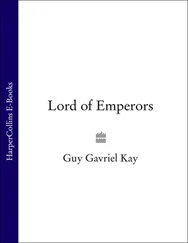They were sent away. Across rivers, over mountains. Sometimes they died. Reform would always have opponents, men clinging fiercely to the old ways, whether out of genuine belief or because those old ways had made their family fortunes.
It didn’t matter which. That was what he’d come to understand. When you were reshaping an empire you couldn’t be looking over your shoulder for intrigue, cunning opposition, worrying if a tail-star seen one spring or summer might send a panicky emperor hurrying to perform appeasing rituals—and straight back to the old ways.
You needed a cleared field before you and no danger behind. Comets had put him out of power twice in his early years, once under the late emperor, once with Wenzong. Being unpredictable was the prerogative of those who sat the Dragon Throne. Their loyal advisers needed to limit the consequences.
That was why Kai Zhen’s idea of an imperial garden had been so brilliant. Dejin had allocated considerable funds and resources to the newly created Flowers and Rocks Network. Not enough, in the event, not nearly enough. The sums grew. The Genyue had taken on a life of its own. All gardens did that, but …
The human labour required throughout the empire and the level of taxation demanded had begun to be overwhelming. And with the emperor enraptured by the Genyue, it was too late to stop or scale back, despite rebellion stirring in the south and west and growing outlaw bands in forests and marshes.
The emperor knew what he wanted for his garden, and you couldn’t tell an emperor he wasn’t going to get it. He wanted Szechen nightingales, for example, hundreds of them. Boys and men went hunting there, stripping the forests of songbirds. Wenzong wanted a mountain brought, as a symbol of the Five Holy Mountains. He wanted cedarwood and sandalwood from the south, a bridge, entirely of gold, leading to an island with pavilions of marble and onyx and rosewood, set in an artificial lake. He wanted trees on the island made of silver, among the real ones.
Sometimes you set events in motion, like a river, and if it flooded, or grew engorged …
It was possible that some of what he’d done or permitted through the years had been less than perfectly judged and implemented. What man alive (or ever living) would claim perfection?
The prime minister of Kitai adjusted his black, fur-trimmed robe. There was a breeze coming through the window and he caught a chill too easily these days.
For diversion he had tried, not long ago, to think of a good thing about growing old. He’d thought he might write (or dictate) an essay about it. The best he’d been able to come up with was that you might be less at the mercy of the desires of your body.
No one would send a woman to seduce him from his purposes now. Not any more. He read the second letter again, on that thought.
Then he summoned his bearers and went looking for the emperor.
THE EMPEROR OF KITAI was walking in his garden.
It pleased him to do this on any day that was fair, and this one was, a mild morning in autumn, approaching the Ninth of Ninth Festival. The emperor knew there were some among his court who felt he should never walk out of doors. He found them deficient in proper understanding. How could one appreciate, and amend, the paths and byways and the vistas of a garden if one did not walk them oneself?
Although, to call where he strolled a “garden” was to stretch the word almost out of recognition. The enclosed space here was so extravagant, yet so cunningly landscaped, that it was impossible, unless one went right to the walled edges, to know where it ended.
Even at the margins, trees had been densely planted to obscure where the Hanjin city wall began. The palace guard patrolled outside, where the garden’s gates led into the city, or to the palace and its courtyards to the west. You couldn’t see them from within the Genyue.
It was a world he was making here. Hills and lakes shaped to careful design (and then reshaped, whatever the cost, after consulting geomancers). Spiralling paths up mountains that had been raised for him, with waterfalls that could be activated at his desire. There were gazebos and pavilions hidden deep in groves for summer coolness, or situated where sunlight might fall on an autumn or spring day. Each of these was provided with the tools of painting or writing. The emperor might be moved to take up his brush at any moment.
There was also a new magnificence, a central, defining object now in the Genyue. A rock so wide and high (the height of fifteen tall soldiers!), so magnificently pitted and scarred (it had been brought up from a lake, the emperor understood, he had no idea how) that it could truly be said to constitute an image of one of the Five Holy Mountains. A young sub-prefect posted nearby had learned of it—and made his fortune by alerting the administrators of the Flowers and Rocks Network.
It had taken, apparently, a year to claim it from the depths and bring it to Hanjin, overland and then along the Great River and canal. The emperor imagined there must have been some degree of labour and expense involved with something so massive. He didn’t attend to such details, of course.
He had been very attentive as to where the colossal mountain-rock was situated once it arrived. There had been, he understood, some unfortunate deaths in the Genyue itself during the process of moving it into the precisely proper spot. He had first wanted it to surmount and emerge from a hill (a hill they’d made), for greatest effect, but then it had to be shifted after consultation with his geomancers of the Arcane Path and learning their calculations as to auspices.
He probably ought to have consulted them before the first positioning. Ah, well. Decisions in the garden were so complex. He was trying to mirror Kitai, after all, provide a spiritual centre for his realm, ground it securely in the goodwill of heaven. That was part of an emperor’s duty to his people, after all.
But now … now it was where he needed it. He sat in one of his pavilions, this one mostly of ivory, with green jade inlays, and he looked up at his mighty rock with a glad heart.
The Emperor Wenzong was famously compassionate: word of those labourers’ deaths—right here in his garden—had grieved him. He wasn’t supposed to have learned about them, he knew. His advisers were zealous in protecting him from sorrows that might burden the too-generous imperial heart. The Genyue was meant to be a place of calm for him, a refuge from the cares the world brought to those burdened with responsibility.
In his famed calligraphy style, Slender Gold, the emperor had recently devised a clever way of shaping the thirteen brush strokes of the word garden to suggest something beyond what was ordinarily meant, when referring to his own garden.
It was a measure of imperial subtlety, one of his closest advisers had said, that the august emperor had done this, instead of devising or demanding an entirely new word for what was being built here under his wise and benevolent eye.
Kai Zhen, the deputy prime minister, was quite astute in his observations, Emperor Wenzong felt. It had been Minister Kai, of course, along with the eunuch Wu Tong (most recently commanding the Pacification Army against the Kislik in the northwest) who had devised the Flowers and Rocks Network which had allowed the shaping of this garden. The emperor was not a man to forget such loyalty.
There were even nightingales here, you heard them in the evenings. Some had, sadly, died last winter. They were going to try to keep them alive, indoors, this winter, and Minister Kai had assured him that more were on their way even now from warmer climes to grace his groves with their music of the south.
A fine phrase, the emperor had thought.
Читать дальше












